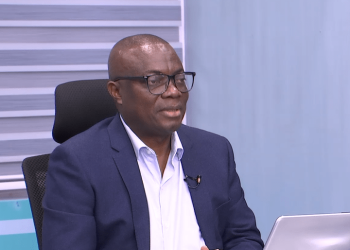The National Film Authority (NFA) of Ghana has issued a stern warning to television stations engaging in the unauthorized broadcast of creative content, describing the act as a serious violation of copyright laws and a threat to the future of the country’s creative industry.
In a statement sighted by People’s Eye GH, the Authority expressed deep concern over the increasing trend, emphasizing that the illegal airing of films, series, and other works discourages investment and creativity.
“These infringements violate content creators’ rights and discourage investment and creativity in Ghana’s creative industries,” Executive Secretary of the NFA, Kafui Danku Pitcher, said.
The NFA’s move comes on the heels of a growing outcry from filmmakers who have spoken out against piracy involving Ghanaian TV stations. Nigerian actress and filmmaker Omoni Oboli recently called attention to the issue after her new film Twin Deception was broadcast on a Ghanaian television station without her consent, just hours after its release on her official YouTube channel.
“It’s utterly shameful,” Omoni wrote on Instagram, adding, “You are not promoting my film if you rip it off my YouTube channel (without licensing and permission) and show it on your TV station. You are stealing from me for your own personal gain.”
Her frustration was shared by fellow Nollywood actress Bimbo Ademoye, who earlier lamented that Ghanaian stations had aired her movie without authorization. Ghanaian actress Juliet Ibrahim also called for urgent intervention, urging authorities to clamp down on the piracy practices.
Building on these complaints, the NFA stressed that it is working with relevant institutions to investigate and take decisive actions against offending TV stations, warning that “offenders risk having their licenses suspended or revoked.”
“The NFA reminds all television stations that the Copyright Act, 2005 (Act 690), and other applicable laws provide clear guidelines on using protected works. These laws explicitly state that any public performance or broadcast of copyrighted content without the rights holder’s permission is illegal and punishable by law,” the statement noted.
The Authority further urged broadcasters to regularize their content by securing appropriate licensing agreements with copyright owners, respect intellectual property rights, and ensure all films and audiovisual content are classified before airing.
As Ghana’s creative economy shows promise for national growth and global recognition, the NFA emphasized that its success depends largely on the respect for intellectual property.
“The growth of Ghana’s creative industry hinges on fair compensation to creators and the protection of their rights,” the NFA stated, encouraging media platforms to support a lawful and thriving creative sector.










Awesome https://is.gd/N1ikS2
Good https://is.gd/N1ikS2
Good https://is.gd/N1ikS2
Good https://is.gd/N1ikS2
Very good https://is.gd/N1ikS2
Awesome https://is.gd/N1ikS2
Awesome https://is.gd/N1ikS2
Good https://is.gd/N1ikS2
Very good https://is.gd/N1ikS2
Awesome https://is.gd/N1ikS2
Awesome https://is.gd/N1ikS2
Awesome https://is.gd/N1ikS2
Good https://is.gd/N1ikS2
Awesome https://is.gd/N1ikS2
Very good https://is.gd/N1ikS2
Very good https://is.gd/N1ikS2
Good https://is.gd/N1ikS2
Awesome https://is.gd/N1ikS2
Very good https://is.gd/N1ikS2
Awesome https://is.gd/N1ikS2
Very good https://is.gd/N1ikS2
Awesome https://is.gd/N1ikS2
Good https://is.gd/N1ikS2
Good https://is.gd/N1ikS2
Very good https://is.gd/N1ikS2
Very good https://is.gd/N1ikS2
Very good https://is.gd/N1ikS2
Good https://is.gd/N1ikS2
Awesome https://is.gd/N1ikS2
Awesome https://is.gd/N1ikS2
Very good https://is.gd/N1ikS2